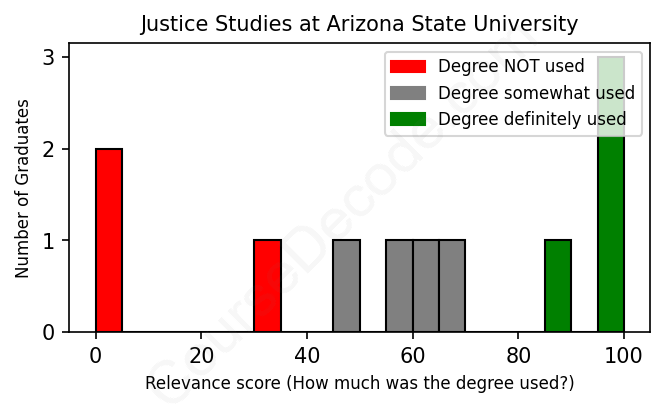
First, some facts. Of the Justice Studies graduates from Arizona State University we've analyzed , here's how many have used (or NOT used) their degree in their career:

These are estimates based on AI analysis of 11 LinkedIn profiles (see below).
The verdict? Below average. Overall, with an average relevance score of 58%, Justice Studies graduates from Arizona State University have a lower likelihood (-9%) of finding work in this field compared to the average graduate across all fields:
And for comparison, here's the chart for all profiles we've looked at across all degrees.
Also, after graduating, 45% of these graduates have pursued further education other than another Bachelor's degree (such as a Masters degree or other), compared to the average across all profiles of 35%. This suggests you may need more than just a Bachelors degree to be competitive as a Justice Studies graduate.
See the details:
|
Relevance score: 56% We think this person has gone into a career only somewhat relevant to their degree. We think this person has gone into a career only somewhat relevant to their degree.
DEGREE INFOGraduated in 2011 from Arizona State University with a Bachelor of Science (B.S.) in Justice Studies. No other secondary education since. JOB HISTORY SINCE GRADUATIONCook Tournant The Broadmoor Aug 2011 - Jun 2013 Lobbyist Specialist  Arizona Secretary of State's Office Aug 2013 - Jun 2014 Elections Program Manager  Arizona Secretary of State's Office Jun 2014 - Apr 2015 Digital Services Manager  Arizona Secretary of State's Office Apr 2015 - Jan 2017 Product Manager  Ipro Tech Feb 2017 - Jun 2020 Product Manager  Exterro Aug 2020 - Present ABOUTNo information provided. |
The top 10 most common jobs done by the graduates we've analyzed (ranked most common to least) are:
After analyzing the job profiles of individuals who graduated with a degree in Justice Studies from Arizona State University, it seems that many common career paths are centered around the legal and public sector. A significant number of graduates have found roles directly related to the field, such as legal assistants, law clerks, and various positions at the U.S. Attorney’s Office. These jobs typically require a solid understanding of justice principles, legislative processes, and public policy—areas that are core to the Justice Studies curriculum. Additionally, roles that involve working with victims of crime and civil rights, such as the Victim Notification System Specialist and positions within the ACLU, show strong relevance to their degree, indicating that many have successfully channeled their education into meaningful advocacy and legal work.
However, it’s also evident that some graduates have ventured into fields that are less connected to their degree. Jobs like Cook Tournant, Customer Service Specialist, and various positions in business development or technology, while they might require valuable skills such as communication or management, do not leverage the specific knowledge and training provided by a Justice Studies program. Overall, while a fair number of graduates have landed roles that utilize their degree effectively, there remains a noticeable portion who have drifted into unrelated industries, highlighting that not all paths taken by Justice Studies alumni are directly tied back to their area of study.
Here is a visual representation of the most common words in job titles for Justice Studies graduates (this is across all Justice Studies graduates we've analyzed, not just those who went to Arizona State University):

When looking at the career trajectories of Justice Studies graduates from Arizona State University, it's clear that many of them are finding their way into roles that are closely related to justice, law, and public policy, especially within the first few years after graduation. For instance, a number of graduates have started in roles like victim notification system specialists and legal assistants, which indicate they are utilizing their degrees right away in positions that help support victims and navigate the legal system. Even those who might land a job that's not directly tied to Justice Studies early on tend to switch gears into more relevant roles within a few years, as seen in the progression of some individuals who have moved into law clerking or policy-making positions after gaining initial experience in other fields.
Looking five or ten years down the line, many of these graduates appear to be advancing into significant roles that further their careers in legal and advocacy spaces. There are quite a few who have moved up to positions like staff attorneys or project managers within legal-social service organizations, reflecting a solid trajectory in their respective fields. However, it's also noticeable that some graduates traverse into less traditional paths, like tech or business development, which might not align as closely with their Justice Studies background. Overall, while many graduates are indeed leveraging their education for meaningful careers in justice and law, there are also a fair number who end up in roles that, while successful, stray from their original field of study. It's a mixed bag, but there's definitely a trend toward finding relevant, impactful work as time goes on.
Getting a Bachelor’s degree in Justice Studies at Arizona State University is pretty manageable overall, especially if you stay organized and engaged in your classes. The coursework covers a variety of topics related to the legal system, criminology, and social justice, which can be intriguing if you have a passion for those subjects. It may be a bit more challenging than a few other majors, mainly because you’ll be writing essays, analyzing case studies, and possibly working on group projects, but you won’t find it overwhelming if you put in the effort. Overall, it’s about average in terms of difficulty—definitely doable with some dedication!
Most commonly, in the LinkedIn profiles we've looked at, it takes people 4 years to finish a Bachelor degree in Justice Studies.
Looking at these Arizona State University Justice Studies graduates, it's a mixed bag when it comes to the money they've made. Some folks have really climbed the ladder, especially those in project management and product management roles, which generally pay well—like the product manager who bounced from Ipro Tech to Exterro. Others, like the graduates who went into teaching or legal assistant roles, might not be raking it in as much, especially early in their careers. Positions at the U.S. Attorney's Office sound pretty respectable too, but it takes time and experience to see a bump in salary in those fields. Overall, while some are definitely making decent money, others are likely on the lower end, especially if they're still starting out or working in nonprofit sectors. It just goes to show that what you do with your degree really affects your earnings!
Here is a visual representation of the most common words seen in the "about" section of LinkedIn profiles who have a Bachelor degree in Justice Studies (this is across all Justice Studies graduates we've analyzed, not just those who went to Arizona State University). This may or may not be useful:

Here are all colleges offering a Bachelor degree in Justice Studies (ordered by the average relevance score of their Justice Studies graduates, best to worst) where we have analyzed at least 10 of their graduates:
| College | Score | Count |
|---|---|---|
 San Jose State University San Jose State University
|
77 | 12 |
 James Madison University James Madison University
|
62 | 14 |
 Arizona State University Arizona State University
|
58 | 11 |